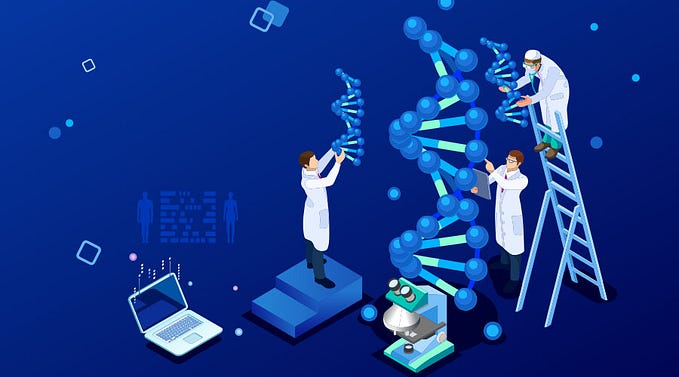Reflecting on My Summer Computational Biology Internship at Ocean Genomics

This summer, I had the incredible opportunity to be an intern at Ocean Genomics, a startup that is trying to push the forefront of RNA-sequencing by compiling and creating methods to analyze RNA-sequencing today in one pipeline, for two months.
As someone who recently got into computational biology and was looking for an internship, this opportunity was perfect for me to learn more about the field while challenging myself. After passing a rigorous technical interview with tens of undergraduate applicants, I was one of two chosen to work at the company.
New to both startup culture and computational biology, this internship was a steep learning curve and taught me a ton of valuable lessons.
Computational Biology
At Ocean Genomics, I worked on reducing inaccuracies in FFPE-degraded RNA-sequencing samples (FFPE is a method to store samples that causes chemical degradation over time). What I was trying to do was reduce bias in the sample to move it closer to a ground truth sample without any degradation.
What that meant was researching methods to reduce bias and restructuring it for Ocean Genomics’ own pipeline. Quickly after delving into past analyses of FFPE samples, I realized I was in over my head. I had to start from the basics: what are the steps to get from RNA to a quantifiable string to run analyses upon?
For example, in the first week, I built my knowledge in RNA-sequencing by taking this course that gave a primer about using AWS and Unix in RNA-sequencing along with basic concepts to understand. Although some of it was above my head, I was able to build enough of a knowledge base to start working on the project and then learn as I go for the rest of the material.
Although it required going over my 40 hours for the first few weeks, I was able to catch up and learn about these various terms, at least enough for doing my project.
The Computational Biology Meeting
Every week, all of the computational biologists and the cofounders met to discuss topics that they needed help with. Joining that call, I realized how much I needed to learn in the field still. Although I was able to comprehend their discussions at a base level, I still needed to build the level of expertise needed to problem solve at their level, something that took years of practice.
This meeting acted as a humbling experience and motivated me to continue to learn more. I thought if I was smart enough to become an intern at this company in high school, I was smart enough to provide insights at the meeting. However, I realized that knowledge takes time, and isn’t something you can just expect to learn in two weeks.
What I Learned
From the internship, I learned a ton about RNA-sequencing, specifically about quality control analyses and quantification methods. Outside of that, I learned about how to read research papers and distill them for useful information.
However, outside of the technical knowledge, I learned the skill gap between me and PhDs, which acted as a humbler and motivator for future learning.
Computer Science
Going into the internship, I expected to do heavy research; however, most of my learning was centered around coding and analyzing the code through statistical methods.
I ended up using Python, R, and Bash, despite having minimal knowledge in the latter two. I realized that learning and applying programming languages are two different things.
I’d learned about all of these frameworks at a high level in Python and created so many projects with specialized libraries, but in the ending, that was all useless. Aside from a couple of aspects (generators, parallel processing, data science libraries, and virtual environments), most of the things I required in the internship were things you could learn in introductory Python classes.
Most of the difficulty came from the problem-solving aspect of it. At times, I was assigned a problem that seemed relatively easy but took hours to complete. I found myself thinking about the problem in my sleep and waking up at midnight attempting to solve it. As someone who’s never needed particularly long to solve coding problems, this was a unique experience that showed me how vital problem solving is to computer science.
“Common Knowledge”
My boss expected me to know a bunch of things coming into the internship, including SSH, Linux, AWS, and working with servers. As someone who’s never encountered any of those, I faced a steep learning curve that pushed me to my limits.
I realized computer science required not only the basics like Python but also complementary services. Although I managed to scrape by the internship with minimal knowledge of these tools, I realized the importance of these services for future internships and took introductory courses after finishing the internship.
Startup Culture
Coming into the internship, I had no idea what to expect. I’d never worked in a company 40 hours/week, and I had no clue what the expectations were of me.
Luckily, people were understanding of my situation and offered to guide me along the way. This was surprising, as startups are normally seen as a cutthroat, innovative environment where people are already overworked; however, at the company, the culture was, albeit not relaxed, welcoming and allowed me to have a smooth transition into work.
After a day of getting situated, a ton of new terms kept getting thrown at me. Merge this branch with the Github repo. Add this task to the Jira sprint. Scrum will be moved to 6:45 AM. I found myself Googling a new term almost every hour for stuff that was not even related to computational biology.
Although it took time, I learned the startup lingo and was able to use some of it myself.
Presentations
Midway into the internship and at the end of the internship, I gave presentations to the entire 17-person team at Ocean Genomics. After the presentations, I learned these things:
- No one cares if your presentation deck design is beautiful or looks terrible. All they care about is the information that comes across.
- Be ready for questions. The presentation is 1/2 of the time, and the Q+A after is the other half.
- No one knows what the heck you’re talking about if you explain your research the way you explain it to your boss. Explain it in a way that a nontechnical person can understand.
- Tell the truth if you don’t know something. It’s okay to not know something, and you can always just research it later.
- Never overexaggerate to make your results sound better. I was working for a company where my work would have an actual impact. Overexaggerating would be a detriment to the company, even if my actual results weren’t the best.
Conclusion
The internship experience was a rollercoaster of a ride, and I loved every moment of it. From waking up for 6:30 AM touch bases to nearly using 80% of the server capacity (yep that actually happened), there were definitely some ups and downs during the whole experience.
Out of the whole process, here are the major things I learned:
- I still have a ton to learn. From learning about computational biology to computer science to developer tools to startup culture, there was so much I learned in this internship that I have to continue to go deep into for future internships.
- Take help from your mentors and coworkers. Because I felt intimidated, I didn’t ask for help in my first month from people outside of my boss. This proved harmful, as sometimes, my boss didn’t know the answer, and we ended up taking much longer to solve the problem than needed.
- Recognize that startups hire people for problem-solving and drive more than knowledge. Sure, knowledge is something that startups look for, but the reason why interviews are so problem-solving-focused is to find those candidates that can go above the traditional applicant to find an innovative way of looking at the problem.
- Take a step back and break the problem into smaller chunks if you’re confused. As someone who was bombarded with technical terms, I didn’t understand in papers, I realized that I had to first build my knowledge in the field before diving right into the work.
This internship taught me a ton of lessons for future internships and future learning. I’m excited to see where I intern next and for the experiences I’ll gain there.
Shoutouts
Wanted to give a quick shoutout to @Hossein Asghari and @Maya Bishop for helping guide me through the internship. Hossein was an incredible boss and gave me support when I needed it; without him, my internship experience would have been much worse. Maya was instrumental in helping coordinate the internship and made it possible for a high schooler to take part in an internship usually only offered to undergraduates.
Hey, I’m Aditya, a 17-year-old interested in machine learning and bioinformatics. If you want to talk more, schedule a meeting: Calendly! If you’re interested in connecting, follow me on Linkedin, Github, and Medium.










